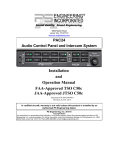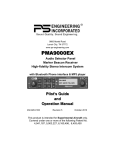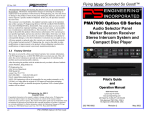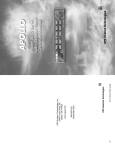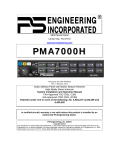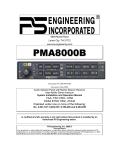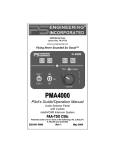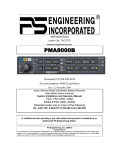Download PS Engineering PAC24 Operating instructions
Transcript
9800 Martel Road Lenoir City, TN 37772 , 0503 Pilot’s Guide and Operation Manual FAA Approved TSO C50c JAA-Approved JTSO C50c Revision 4 202-240-0002 April 2009 Patent No 5,903,227 and 6,160,496 Audio Selector Panel with Intercom System Flying Never Sounded So Good!® PS Engineering, Inc. 2009 © Copyright Notice Copyrighted information in this manual is subject to change without notice. PS Engineering reserves the right to improve or change the products or contents of this manual, without notification of any person or agency. The contents of this pilot’s guide may be downloaded, stored and reprinted for personal use provided that this copyright information is included. Commercial use is strictly prohibited. For further information contact the Publications Manager at PS Engineering, Inc., 9800 Martel Road, Lenoir City, TN 37772. Phone (865) 9889800 PAC24-Series Pilot Guide Revision 4, April 2009 Page 1 This Pilot Guide provides detailed operating instructions for the PS Engineering PAC24-series, High Performance Audio Selector Panel/Intercom Systems. Please read it carefully before using the equipment so that you can take full advantage of its capabilities. This document is divided into three sections covering the basic operating areas of the PAC24 systems. They are transceiver selection, audio selector, and intercom. 1 4 5 2 3 PAC24 Controls 1) 2) 3) 4) 5) Receiver Source Selection Transmitter Selection Volume / Power Controls Speaker Selector Intercom Mode Selector Power Switch (3) (EMG-Fail Safe Operation) Unit power is turned on and off by pushing the center (pilot) volume knob. The power switch controls the audio selector panel functions and intercom. Single Panel Fail Safe Operation In the OFF or "EMG" position, the pilot is connected directly to Com 1. This allows communication capability regardless of unit condition. Any time power is removed or turned OFF, the audio selector will be placed in the fail-safe mode. Page 2 PAC24-Series Pilot Guide Dual Panel Fail Safe Operation In a dual installation, the PAC24 designated as Pilot’s at installation, will default to Com 1. The audio panel designated as copilot will not operate in the off position. This prevents compromising the pilot’s audio capability in the event of a dual audio panel problem. Microphone Selector (2) There are 10 pushbuttons associated with the communications transceivers. The lower buttons control which transceiver is selected for transmit. Receive Transmit The PAC24 gives priority to the pilot’s PTT. If the copilot it transmitting, and the pilot presses his PTT, the pilot’s microphone will be heard over the selected transmitter. The PAC24 has an automatic selector mode. Audio from the transceiver selected by the Xmit button is automatically heard in the headsets and speaker (if selected). You can check this function by switching from COM 1 to COM 2 and watch the selected audio light on the selector change from COM 1 to COM 2. This ensures the pilot will always hear the audio from the transceiver he is transmitting on. When switching from COM 1 to COM 2, while COM 2 audio had been selected, Com 1 audio will continue to be heard. This eliminates the pilot having to switch Com 1 audio back on, if desired. When switching from COM 1 to COM 2 while Com 2 has NOT been selected, Com 1 audio will be switched off. In essence, switching the mic selector will not effect the selection of Com receiver audio. This is true of all transmitter selections. When the duplex, or TELEPHONE mode is implemented, Com 5 becomes the “TEL” position. In a single installation, the intercom mode PAC24-Series Pilot Guide Revision 4, April 2009 Page 3 select switch determines who is on the phone: ISO - pilot, CREW - pilot and copilot, ALL - pilot, copilot, passengers In a standard dual installation, the pilot and copilot can select TEL mode independently by pressing their respective COM 5 button. The passengers are on the phone only when the pilot has selected TEL mode and his switch is in the ALL position. The copilot cannot put the passengers on the phone, and the passengers can only get on the phone when the pilot is on the phone. In an observer dual installation, the crew box works like a single installation. The observer is treated like a passenger, so he would be on the phone line when COM5X is selected and the intercom switch is in ALL mode. The observer cannot select telephone mode independently. Stuck Microphone Protection The PAC24 has a function designed to prevent unintentional radio transmissions and blocked frequencies. After 35 seconds of continuous PTT on any input, the PTT line is lifted, and will remain unkeyed until the PTT input is recycled. NOTE: Selecting the COM 5 –TEL– mode will disable pilot and copilot intercom, as the intercom circuit is transferred to the telephone use. In crew or ISO mode, selecting TEL mode removes the passengers access to the telephone. Swap Mode (Remote transfer of com transceivers) With a yoke mounted, normally open, momentary switch, the pilot can change from the current Com transceiver another by depressing this switch. Activating the swap switch will select the next transceiver, cycling from 1 to 2 to 3 etc. Observer transmit selection (part number –040X). If the installation uses a dual panel, observer configuration, the crew panel serves the pilot and copilot, while the second audio panel serves the observer. The pilot and copilot have access to all transceivers. The observer can access any radio that the crew does not have selected for transmit. If the crew selects a radio for transmit that the observer has previously selected, all parties can transmit, but the pilot, copilot, have priority over the observer (in that order). If the observer selects a different radio, and then attempts to re-select a radio in use by the crew, the observer will Page 4 PAC24-Series Pilot Guide not have transmit access. The crew has priority on all radios. The observer can listen to all radios if desired. Receive Audio Selector (1) Receiver audio is selected through 9 momentary push-button, backlit switches. Because the microphone push-button selector switch controls what transceiver is being heard, you will always hear the audio from the transceiver that is selected for transmit. The users can identify which receivers are selected by noting which of the green switch LEDs are illuminated. Push buttons for Nav 1, Nav 2, MKR (Marker), and AUX (auxiliary or ADF in –0500), are momentary type switches. When one of these buttons is pressed, it will place the audio in the headphone or speaker output, and the LED will illuminate. Press the switch again and will remove that receiver from the audio. If the aircraft is equipped with an ADF or DME, that audio is available through the AUX button. NOTE: On PAC24 –0500 units (Vertical) the AUX is replaced with ADF button and DME audio not present. Speaker Amplifier (4) The 3-position "SPR" switch controls the distribution of the audio in the cockpit or external (public address) speakers. In the up “SPR” position all selected audio is presented to the cockpit speaker. Unswitched audio, (autopilot disconnect, altimeter warning, etc.) will come through the speaker regardless of the speaker button position. In PA, the primary (pilot) microphone audio is routed to the PA or external speaker (J3 pin B) when the PTT is active. The copilot mic input can continue to transmit on the selected radio. Key “Click” The PAC24 is equipped with a “click” function that provides an aural feedback to the user in addition to the tactile button push. This sound can be enabled or disabled by simultaneously holding the COM 1 and COM 2 buttons in for at least 5 seconds. Any person hearing the radios will also hear the key click. PAC24-Series Pilot Guide Revision 4, April 2009 Page 5 Allow at least 20 seconds between turning the key click on and off. Split Mode The PAC24 has a flexible split mode, which allows one pilot to use one transceiver while the other can communicate on another. There are differences in the Split Mode in a single, or a dual audio panel installation. Note: Due to the nature of VHF communications signals, and the size constraints in general aviation aircraft, it is probable that there will be some bleed-over in the Split mode, particularly on adjacent frequencies. PS Engineering makes no warranty about the suitability of Split Mode in all aircraft conditions. Split Mode, Single panel The split mode can be activated at any time by pressing the desired combination of XMT buttons. For instance, to activate a Com 1/Com 2 split, press and hold the Com 1 button, and then press the Com 2 button while holding the Com 1 button. This places the pilot on Com 1 and the Copilot on Com 2. Split mode for Com 5, in normal (not TEL/Duplex) is possible. Pilot on Com 2, with copilot on Com 3, Com 4 or Com 5, is also possible. Note: Split Mode does not turn off other (Nav, ADF, etc.) selected audio to pilot. Copilot does not hear other selected radios. Passengers will hear the pilot’s audio selection Split Mode, Dual Panel In a dual panel installation, both pilots have access to any combination of transceivers. Because there is cross communication, each PAC24 knows the other unit’s transmitter selection. The audio panel designated as “Pilot’s” will have transmission priority over the panel designated as copilot’s, when both panels are keyed for transmit on the same radio. It is not necessary to activate the split mode by holding the buttons in a dual installation. Page 6 PAC24-Series Pilot Guide Intercom Operation IntelliVox® VOX-Squelch No adjustment of the IntelliVox® squelch control is necessary. There is no field adjustment. Through individual signal processors, the ambient noise appearing in all six microphones is constantly being sampled. Non-voice signals are blocked. When someone speaks, only their microphone circuit opens, placing their voice on the intercom. The system is designed to block continuous tones, therefore people humming or whistling in monotone may be blocked after a few moments. For consistent performance, any headset microphone must be placed within ¼-inch of your lips, preferably against them. (ref: RTCA/DO214, 1.3.1.1 (a)). It is also a good idea to keep the microphone out of a direct wind path. Moving your head through a vent air stream may cause the IntelliVox® to open momentarily. This is normal. The IntelliVox® is designed to work with normal aircraft cabin noise levels (70 dB and above). It loves airplane noise! Therefore, it may not recognize speech and clip syllables in a quiet cabin, such as in the hangar, or without the engine running. This is normal. For optimum microphone performance, PS Engineering recommends installation of a Microphone Muff Kit from Oregon Aero (1-800-8886910). This will not only optimize VOX performance, but will improve the overall clarity of all your communications. Volume Control (3) The volume control is a concentric knob. The inner knob adjusts the loudness of the intercom for the pilot (in single panel installation) and the outer knob controls copilot and passenger volume. It has no effect on selected radio levels or music input levels. In dual installation, the inner knob controls the main volume (the person connected to the audio panel) and the outer knob controls the passengers. Intercom Modes (5) The lower switch on the left side of the audio panel is a 3-position PAC24-Series Pilot Guide Revision 4, April 2009 Page 7 mode switch that allows the crew to tailor the intercom function to best meet the current cockpit situation. Single Installation Intercom Modes ISO: The pilot is isolated from the intercom and is connected only to the aircraft radio system. He will hear the selected aircraft radio reception (and sidetone during radio transmissions). The copilot will hear passengers’ intercom and entertainment, while passengers will hear copilot, intercom and entertainment. ALL: All parties will hear the aircraft radio and intercom. All will hear entertainment. During any radio or intercom communications, the music volume automatically decreases. The music volume increases gradually back to the original level after communications have been completed. CREW: Pilot copilot and passengers are connected on one intercom channel and have access to the selected aircraft radios. They may also listen to Entertainment. In a single panel installation without expansion, the passengers will also hear what the copilot hears Dual Installation Intercom Modes ISO: The primary pilot connected to the PAC24 is isolated from the intercom and is connected only to the aircraft radio system. He will hear the selected aircraft radio reception (and sidetone during radio transmissions). The crewmember on the other audio panel will hear locally selected radio audio, passengers’ intercom and entertainment, while passengers will hear the radio, intercom and entertainment. ALL: All parties will hear the aircraft radio and intercom. All will hear entertainment. During any radio or intercom communications, the music volume automatically decreases. The music volume increases gradually back to the original level after communications have been completed. CREW: Pilot and copilot are connected on one intercom channel and have exclusive access to the locally selected aircraft radios. They may also listen to Entertainment. Passengers can continue to communicate with themselves without interrupting the Crew and also may listen to Entertainment. Page 8 PAC24-Series Pilot Guide Entertainment Input The audio selector panel has provisions for one entertainment input device in each audio panel. The volume control does not affect music level. Anytime a person speaks on the intercom, or there is radio traffic, the music will be muted. It will return gradually, through the use of SoftMute™ circuitry. The SoftMute™ can be defeated for a “Karaoke Mode” (music does not mute) by pressing the NAV1 and NAV2 buttons simultaneously for at least 3 seconds. Pressing the buttons again will reactivate SoftMute™. While in the ISO (Isolate) mode, the non-isolated crewmember and passengers will hear entertainment. When in the ALL mode, all persons will hear the entertainment source. Music Off “Music Off mode” may be selected in cases where a music input is not connected, or in use, but audio noise can be heard due to other loads or cross-talk in the system. Music can be inhibited completely by pressing NAV1 and AUX (ADF in –0500) for at least 3 seconds. Music Off will override karaoke mode Telephone Mode The Com 5 mode can serve as a full duplex interface for telephone systems if the installation is correctly configured. When interfaced with an approved airborne telecommunications system, the PAC24 can serve as an audio control and distribution center. The crewmember’s telephone access is the "Com 5" button on the audio panel. When Com 5 is active in the duplex mode, the TX button will blink about twice as fast as the normal transmit rate. When the intercom is in ALL mode, the pilot can speak on the phone only if the Com 5 is selected for transmit (Com 5 XMT button activated). All intercom positions will hear the telephone conversation. All will hear selected audio. Com 1 audio is automatically heard in the headsets. The pilot and copilot will have transmit capability on the other selected transceiver, simply by using their respective PTT switch. In CREW mode, the pilot and copilot are may use the telephone, with their respective hook switch (the pilot selects Com 5 on the Xmt selector). Any passenger who places their switch into the off-hook position PAC24-Series Pilot Guide Revision 4, April 2009 Page 9 will also have access to the phone, and all four passengers will hear the conversation. In ISO intercom mode, when the PAC24 is in the Com 5 mode, the pilot position is in the "Phone Booth." Only the pilot will hear the telephone, and only he will be heard. He will also have access to Com 1 or 2, and will transmit on that radio using the PTT. All selected audio is provided. Note: Because the cell phone uses an intercom circuit, all stations on that circuit will lose intercom capability when the cell phone is in use. Internal Recorder System (Optional) The Intercom Recording System (referred to here as the IRS) is a digital recording system allowing automatic storage and playback of aircraft radio traffic. Operating as a continuous loop recorder, (first message received will be the last heard), the recorder has one minute of recording time or up to 16 messages. With its own built in VOX circuit, there are no buttons to press to start recording. The system automatically begins to record the instant the radio becomes active. Only aircraft radio audio in pilot’s headset is recorded and only the pilot will hear the playback audio. Recorder Operation Recording is automatic; there is no action required by the pilot. To play back the last recorded message, simply press the momentary switch associated with the IRS. Each additional press of the button will play the preceding recorded message. You must wait for the message to finish playing before accessing the prior message. To cancel the playback, press and hold the playback button for two seconds. The next time the button is pressed, the next earlier message will be heard. Concurrent Messages When a recorded message is playing there is no recording of incoming messages. Both the playback and the received radio traffic will be presented to the pilot headset.. Page 10 PAC24-Series Pilot Guide Warranty and Service Warranty In order for the factory warranty to be valid, the installations in a certified aircraft must be accomplished by an FAA-certified avionics shop and authorized PS Engineering dealer. If the unit is being installed by a noncertified individual in an experimental aircraft, a factory-made harness must be used for the warranty to be valid. PS Engineering, Inc. warrants this product to be free from defect in material and workmanship for a period of three (3) years from the date of sale. In the event of a problem, contact the authorized PS Engineering Dealer where the product was purchased for assistance. Units will not be accepted by PS Engineering for repair without a Return Authorization. During the first twelve (12) months of the warranty period, PS Engineering, Inc., at its option, will send a replacement unit at our expense if the unit should be determined to be defective after consultation with the PS Engineering dealer who sold the unit and a PS Engineering, Inc. factory technician. For the remaining twenty-four (24) months of the PAC24-series, three-year warranty period, PS Engineering, Inc., at its option, will send a replacement unit at the customers expense if the unit should be determined to be defective after consultation with an authorized PS Engineering dealer. All transportation charges for returning the defective units are the responsibility of the purchaser. All domestic transportation charges for returning the exchange or repaired unit to the purchaser will be borne by PS Engineering, Inc. The risk of loss or damage to the product is borne by the party making the shipment, unless the purchaser requests a specific method of shipment. In this case, the purchaser assumes the risk of loss. This warranty is not transferable. Any implied warranties expire at the expiration date of this warranty. PS Engineering SHALL NOT BE LIABLE FOR INCIDENTAL OR CONSEQUENTIAL DAMAGES. This warranty does not cover a defect that has resulted from improper handling, storage or preservation, or unreasonable use or maintenance as determined by us. This warranty is void if there is any attempt to dissemble this product without factory authorization. This warranty gives you specific legal rights, and you may also have other rights, which may vary from state to state. Some states do not allow the exclusion of limitation of incidental or consequential damages, so the above limitation or exclusions may not apply to you. All items repaired or replaced under this warranty are warranted for the remainder of the original warranty period. PS Engineering, Inc. reserves PAC24-Series Pilot Guide Revision 4, April 2009 Page 11 the rights to make modifications or improvements to the product without obligation to perform like modifications or improvements to previously manufactured products. Factory Service The unit is covered by a three-year limited warranty. See warranty information. Call PS Engineering, Inc. at (865) 988-9800 before you return the unit. This will allow the service technician to provide any other suggestions for identifying the problem and recommend possible solutions. After discussing the problem with the technician and you obtain a Return Authorization Number, ship product to: PS Engineering, Inc. Attn: Service Department 9800 Martel Rd Lenoir City, TN 37772 (865) 988-9800 FAX (865) 988-6619 Email: [email protected] Note: ♦PS Engineering will refuse any shipment which does not have either an RMA number, or a detailed description of the problem and a contact phone number. ♦PS Engineering will not be responsible for any units returned in US Mail This Pilot Guide Applies to these PAC24 Models: Model Description Part Number PAC24 PAC24 Audio Control Panel with intercom 050-240-0100 PAC24 Option 1 PAC24 Audio Control Panel with intercom and digital recorder, PAC24 Audio Control Panel for Observer installation PAC24 Audio Control Panel for Observer with recorder PAC24 Audio Control Panel with intercom, Vertical Orientation 050-240-0200 PAC24 Special Mission Units 050-240-0503 PAC24 Observer PAC24 Observer Option 1 PAC24 Vertical PAC24 Page 12 050-240-0400 050-240-0401 050-240-0500 PAC24-Series Pilot Guide












